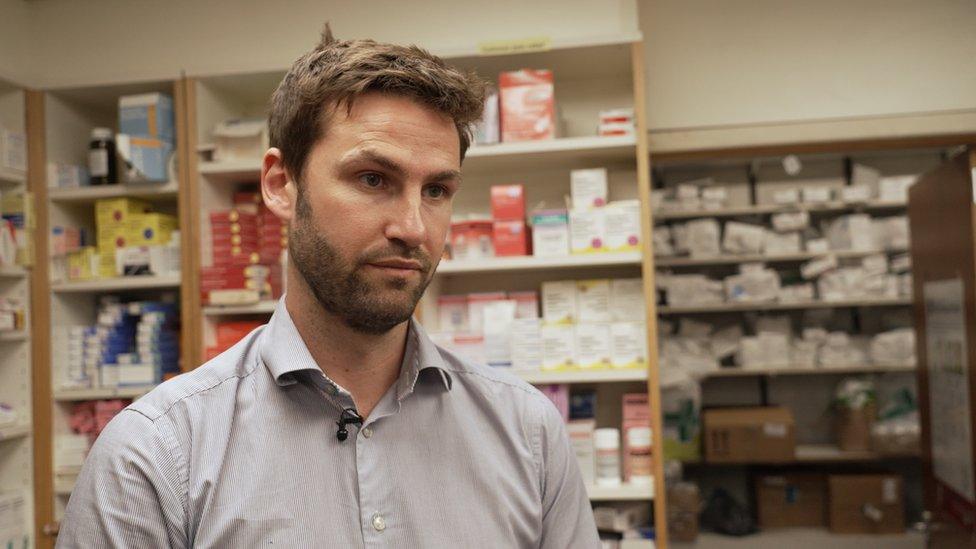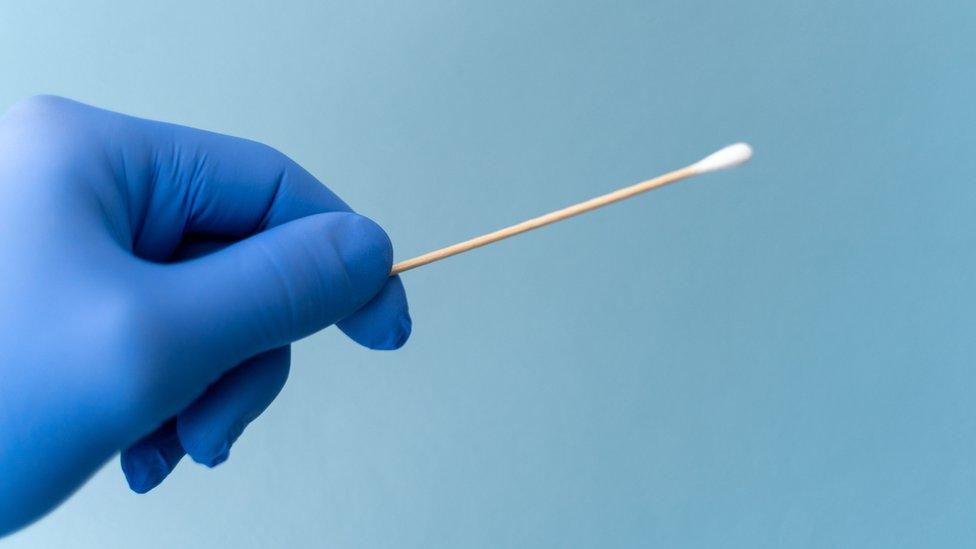Antibiotics: Mum told to crush up pills for strep A baby
- Published

The rash that appeared on Olwen's body after she developed scarlet fever
A mum was told to crush up antibiotics pills for her 10-month-old daughter because of a shortage of medication for children.
Catrin Edwards' baby was diagnosed with scarlet fever caused by strep A in December last year.
But none of the antibiotics commonly used for children were available after a huge rise demand during the step A surge before Christmas.
Public Health Wales said usage had returned to more expected levels.
A pharmacist said the long queues he saw for antibiotics were "fairly grim", he also added there were concerns about overuse of antibiotics leading to antimicrobial resistance.
This is when bacterial become resistant to antibiotics and some common procedures like surgery could become too dangerous to undertake in future.
Mrs Edwards, from Taff's Well, Rhondda Cynon Taf, became concerned after her baby daughter Olwen developed a rash on her body.
The 29-year-old said: "That's all we heard on the news was strep A - that children were dying from it, and that obviously scared me.
"I didn't know much about it, but when I heard it on the news it was quite scary to think that Olwen had it."
Mrs Edwards told BBC Wales Live that giving the pills to her daughter four times a day by dissolving them in breast milk or apple juice took a "long time" and was "scary".
"I felt like a chemist myself - I had to cut the tablets up, crush it up, and then feed that to her four times a day," she said.
"I had to cut it in half, then cut it again into a quarter then put it into the syringe and then flick it to make the tablet dissolve in the liquid.
"If you had a little bit less or a little bit more, I wasn't to know if I was giving her the right amount."

Catrin Edwards was worried after her daughter Olwen developed a rash
Last winter saw a big increase in respiratory infections in Wales and across the UK, most notably strep A.
This is believed to be linked to there being more opportunities for infections to spread after three years of Covid restrictions.
Group A strep bacteria can cause a range of illnesses, including scarlet fever and strep throat.

Jonathan Lloyd Jones described the huge demand for antibiotics
Jonathan Lloyd Jones runs a pharmacy in Maesteg, Bridgend county, and said he remembered the anxiety caused by the strep A surge in the area and the huge demand for antibiotics.
"There was definitely a sense of panic amongst many parents. I'm a parent myself, and I think it was difficult seeing those really horrible stories on the on the news," he said.
"People were queuing up the door every morning. It was fairly grim when you're driving up to work with 30 or 40 children and parents waiting.
"There was a huge amount of antibiotics which were out of stock, and times where we were unable to support people because there just simply wasn't any antibiotics or alternatives, especially for children."
Some pharmacists in Wales, including Mr Jones, can prescribe a range of antibiotics without the need for a GP.
He said they follow the same guidelines and work closely with other health professionals, adding that antimicrobial resistance is "one of the big public health crises that's facing us".

Baby Olwen is now doing well after her strep A episode
Dr Eleri Davies, head of the Harp programme by Public Health Wales which supports NHS Wales to deal with antibiotic resistance, and said the health system needed to refocus on antibiotics use in light of changes since the pandemic.
"We have for all Wales prescribing guidance in place which we constantly review and revise," she said.
"In the context of the learning from the pandemic and the increase in remote consultations that we have seen, we are taking that into account and revising our guidance."
PHW said antibiotics use has now returned to more expected levels in Wales, and that usage overall has fallen significantly over the past 10 years.
Catch up with BBC Wales Live on the iPlayer
Related topics
- Published6 December 2022

- Published12 December 2022

- Published7 December 2022
